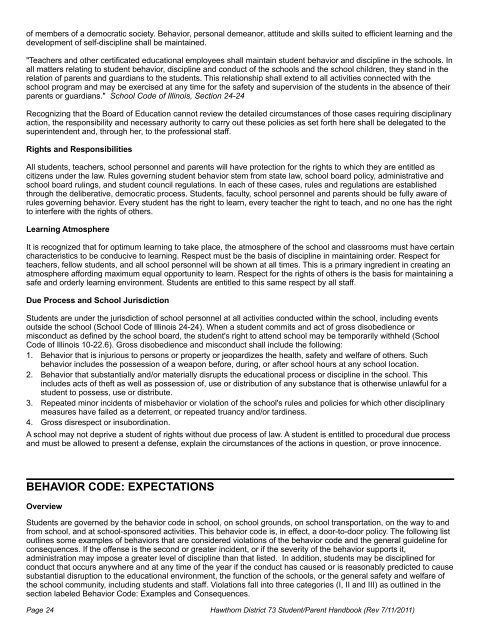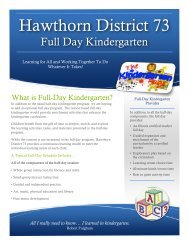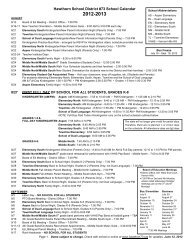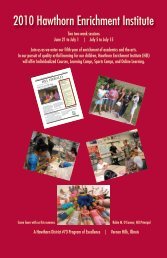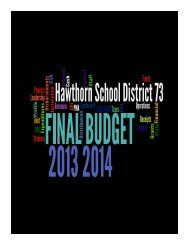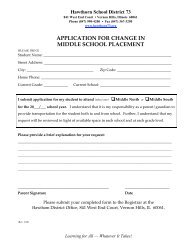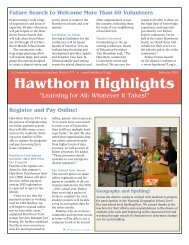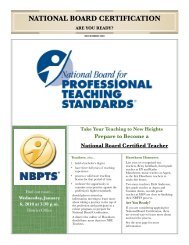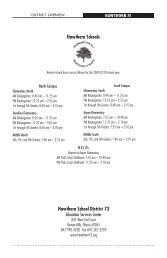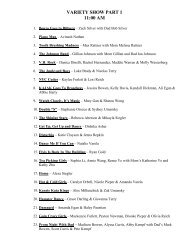Student/Parent Handbook - Hawthorn School District 73
Student/Parent Handbook - Hawthorn School District 73
Student/Parent Handbook - Hawthorn School District 73
Create successful ePaper yourself
Turn your PDF publications into a flip-book with our unique Google optimized e-Paper software.
of members of a democratic society. Behavior, personal demeanor, attitude and skills suited to efficient learning and the<br />
development of self-discipline shall be maintained.<br />
"Teachers and other certificated educational employees shall maintain student behavior and discipline in the schools. In<br />
all matters relating to student behavior, discipline and conduct of the schools and the school children, they stand in the<br />
relation of parents and guardians to the students. This relationship shall extend to all activities connected with the<br />
school program and may be exercised at any time for the safety and supervision of the students in the absence of their<br />
parents or guardians." <strong>School</strong> Code of Illinois, Section 24-24<br />
Recognizing that the Board of Education cannot review the detailed circumstances of those cases requiring disciplinary<br />
action, the responsibility and necessary authority to carry out these policies as set forth here shall be delegated to the<br />
superintendent and, through her, to the professional staff.<br />
Rights and Responsibilities<br />
All students, teachers, school personnel and parents will have protection for the rights to which they are entitled as<br />
citizens under the law. Rules governing student behavior stem from state law, school board policy, administrative and<br />
school board rulings, and student council regulations. In each of these cases, rules and regulations are established<br />
through the deliberative, democratic process. <strong>Student</strong>s, faculty, school personnel and parents should be fully aware of<br />
rules governing behavior. Every student has the right to learn, every teacher the right to teach, and no one has the right<br />
to interfere with the rights of others.<br />
Learning Atmosphere<br />
It is recognized that for optimum learning to take place, the atmosphere of the school and classrooms must have certain<br />
characteristics to be conducive to learning. Respect must be the basis of discipline in maintaining order. Respect for<br />
teachers, fellow students, and all school personnel will be shown at all times. This is a primary ingredient in creating an<br />
atmosphere affording maximum equal opportunity to learn. Respect for the rights of others is the basis for maintaining a<br />
safe and orderly learning environment. <strong>Student</strong>s are entitled to this same respect by all staff.<br />
Due Process and <strong>School</strong> Jurisdiction<br />
<strong>Student</strong>s are under the jurisdiction of school personnel at all activities conducted within the school, including events<br />
outside the school (<strong>School</strong> Code of Illinois 24-24). When a student commits and act of gross disobedience or<br />
misconduct as defined by the school board, the student's right to attend school may be temporarily withheld (<strong>School</strong><br />
Code of Illinois 10-22.6). Gross disobedience and misconduct shall include the following:<br />
1. Behavior that is injurious to persons or property or jeopardizes the health, safety and welfare of others. Such<br />
behavior includes the possession of a weapon before, during, or after school hours at any school location.<br />
2. Behavior that substantially and/or materially disrupts the educational process or discipline in the school. This<br />
includes acts of theft as well as possession of, use or distribution of any substance that is otherwise unlawful for a<br />
student to possess, use or distribute.<br />
3. Repeated minor incidents of misbehavior or violation of the school's rules and policies for which other disciplinary<br />
measures have failed as a deterrent, or repeated truancy and/or tardiness.<br />
4. Gross disrespect or insubordination.<br />
A school may not deprive a student of rights without due process of law. A student is entitled to procedural due process<br />
and must be allowed to present a defense, explain the circumstances of the actions in question, or prove innocence.<br />
BEHAVIOR CODE: EXPECTATIONS<br />
Overview<br />
<strong>Student</strong>s are governed by the behavior code in school, on school grounds, on school transportation, on the way to and<br />
from school, and at school-sponsored activities. This behavior code is, in effect, a door-to-door policy. The following list<br />
outlines some examples of behaviors that are considered violations of the behavior code and the general guideline for<br />
consequences. If the offense is the second or greater incident, or if the severity of the behavior supports it,<br />
administration may impose a greater level of discipline than that listed. In addition, students may be disciplined for<br />
conduct that occurs anywhere and at any time of the year if the conduct has caused or is reasonably predicted to cause<br />
substantial disruption to the educational environment, the function of the schools, or the general safety and welfare of<br />
the school community, including students and staff. Violations fall into three categories (I, II and III) as outlined in the<br />
section labeled Behavior Code: Examples and Consequences.<br />
Page 24 <strong>Hawthorn</strong> <strong>District</strong> <strong>73</strong> <strong>Student</strong>/<strong>Parent</strong> <strong>Handbook</strong> (Rev 7/11/2011)


